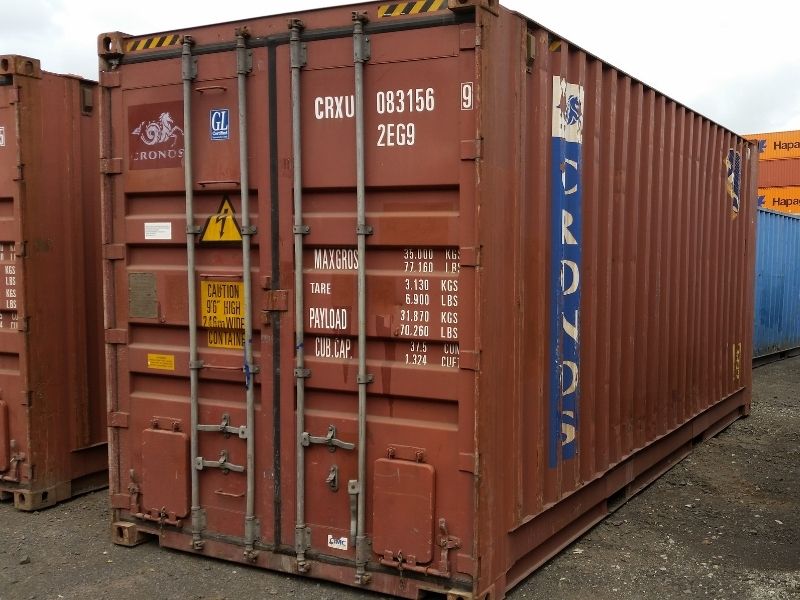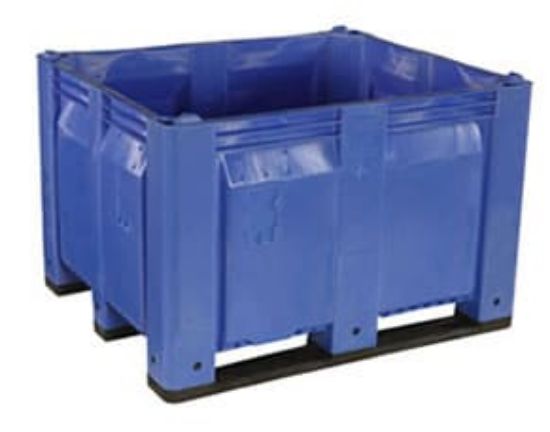Why Bulk Containers Are Necessary for Sustainable and Affordable Transport
Bulk containers play a crucial duty in modern-day logistics. They assist in the reliable movement of large quantities of products, consequently maximizing transport procedures. This method not only decreases expenses however additionally decreases environmental impact through lower emissions and waste generation. As markets seek more sustainable techniques, the adoption of mass containers is coming to be progressively significant. What ramifications does this shift hold for future logistics and supply chain monitoring?

The Benefits of Utilizing Bulk Containers in Logistics
Mass containers reinvent logistics by boosting performance and sustainability. These containers allow for the transportation of big quantities of products in a single trip, significantly minimizing the variety of journeys needed. This not just enhances procedures however also reduces labor prices connected with handling, packing, and dumping. On top of that, mass containers are designed to maximize room use within transport lorries, making sure that even more items can be shipped simultaneously.
The standardization of mass containers also streamlines the logistics process. With consistent dimensions, they can be easily stacked and stored, bring about improved stockroom management. Additionally, mass containers usually feature sturdy products that secure components from damages during transit, thus decreasing product loss and increasing total integrity. Therefore, organizations can experience improved supply chain efficiency, eventually leading to increased profitability and consumer contentment. This mix of aspects makes mass containers a vital possession in modern-day logistics.
Environmental Influence: Decreasing Waste and Carbon Impact
As industries significantly prioritize sustainability, the adoption of mass containers has actually emerged as a vital method for minimizing waste and lowering carbon impacts. These containers reduce using product packaging materials, such as boxes and plastic, therefore significantly decreasing overall waste generation. By combining shipments, mass containers boost transport performance, enabling for even more items to be delivered per journey. This decrease in trips directly associates with reduced greenhouse gas discharges, adding to a smaller carbon footprint.
Additionally, bulk containers can often be recycled or recycled, better minimizing ecological impact. The longevity of these containers assurances they can endure several transportation cycles, decreasing the requirement for single-use alternatives. used plastic containers. By streamlining logistics and promoting effective resource usage, mass containers not just sustain lasting practices but also urge markets to straighten with international ecological objectives. Eventually, their application shows a commitment to ecological stewardship and liable source management
Cost Cost Savings: Exactly How Bulk Containers Lower Transportation Expenditures
While many firms seek ways to improve their profits, using mass containers provides a substantial possibility for decreasing transport costs. Mass containers make the most of the quantity of products transferred, allowing organizations to ship larger quantities simultaneously. This effectiveness decreases the number of journeys needed, directly lowering gas prices and decreasing labor costs connected with loading and discharging.
Additionally, mass containers typically feature structured designs that maximize space application within transport lorries. This implies less empty rooms, causing more reliable use of offered ability. The durability of bulk containers can decrease the risk of product damages throughout transit, minimizing losses and ensuring that even more products arrive undamaged.
Enhancing Supply Chain Efficiency With Mass Storage Space Solutions
Mass storage services play a vital duty in enhancing supply chain performance by maximizing stock management. By consolidating goods right into fewer, larger containers, services can considerably decrease dealing with prices linked with regular transfers and processing. This structured method enables far better monitoring and administration of inventory, eventually bring about enhanced operational performance.
Streamlined Supply Management
Reliable supply monitoring is essential for maximizing supply chain procedures, specifically when organizations adopt bulk storage services. These options allow businesses to maintain higher stock degrees while reducing the frequency of replenishment. By combining materials into bulk containers, business can enhance their stock procedures, minimizing the complexity related to tracking multiple smaller sized plans. This technique facilitates accurate supply matters and improves projecting accuracy, permitting even more enlightened decision-making. In enhancement, bulk storage remedies streamline storage facility organization, making it much easier to locate and access items when needed. As an outcome, companies can accomplish a much more reliable inventory turn over rate, eventually enhancing overall supply chain performance and decreasing the probability of stockouts or overstock situations.

Reduced Handling Expenses
The execution of mass storage space options not only enhances inventory administration yet also considerably lowers managing prices across the supply chain. By settling materials into mass containers, business minimize the requirement for constant handling and transfer between different storage and transport units. This strategy cuts down on labor prices connected with loading, unloading, and moving smaller bundles. In addition, bulk storage minimizes the regularity of deliveries, resulting in lower transport prices and decreased fuel consumption. As an outcome, organizations can optimize their logistics operations, permitting a much more efficient allowance of sources. Inevitably, decreased managing expenses add to improved overall supply chain effectiveness, promoting an atmosphere that sustains both sustainability and financial feasibility.

Adaptability of Mass Containers Across Different Industries
Although many sectors have distinct demands for transport and storage space, mass containers have actually emerged as a versatile remedy that satisfies a wide variety of needs. These containers, varying from big containers to specialized tanks, can fit varied products, consisting of fluids, granules, and powders. In the agricultural sector, bulk containers assist in the transportation of grains and fertilizers, while the food and beverage industry uses them for ingredients and completed items. The chemical market relies upon bulk containers for safely transporting dangerous materials, guaranteeing compliance with security policies. Furthermore, building and construction companies take advantage of mass containers for transporting aggregates and other products. Their flexibility encompasses numerous settings of transport, consisting of ships, trains, and trucks, boosting logistical performance. This convenience not just enhances operations throughout various markets however likewise promotes sustainability by reducing product packaging waste and maximizing area en route. Mass containers play a necessary duty in modern-day supply chain administration.
Future Trends in Mass Container Use and Sustainability
The future of mass container use is progressively shaped by cutting-edge products development that boosts sustainability. In addition, automation in logistics promises to enhance operations, reducing waste and boosting effectiveness. Embracing round economic situation methods will certainly additionally revolutionize just how bulk containers are developed, made use of, and reused, promoting a more lasting transportation landscape.
Innovative Materials Growth
As markets significantly prioritize sustainability, ingenious materials advancement wholesale containers emerges as a significant consider improving environment-friendly transport services. Researchers and producers are checking out eco-friendly plastics, recycled composites, and lightweight metals to lower ecological effect. These materials not just lessen waste however likewise enhance gas effectiveness by reducing the general weight of containers. Additionally, advancements in smart products, which can adapt to varying conditions, enhance the toughness and performance of mass containers. The integration of these ingenious products straightens with round economy principles, promoting reuse and recycling. As the demand for sustainable methods grows, the growth of such products will certainly play a vital role fit the future of bulk container usage in logistics and transport.
Automation in Logistics
Significant developments in automation are poised to transform logistics and the usage of bulk containers, enhancing sustainability in transportation. Automated systems, including drones and self-governing automobiles, are streamlining the movement of mass containers, reducing the dependence on typical fuel-powered transportation. These modern technologies maximize transmitting and filling procedures, boosting and minimizing empty miles gas effectiveness. Furthermore, automated supply monitoring systems improve tracking and monitoring of bulk containers, ensuring better source appropriation and view publisher site minimized waste. The assimilation of the Net of Things (IoT) allows real-time data analysis, enabling aggressive decision-making that straightens with sustainability goals. As automation continues to evolve, it is anticipated to drive even more developments in bulk container use, eventually supporting even more sustainable logistics practices and reducing the ecological effect of transport.
Round Economic Situation Practices
Improvements in automation are setting the phase for an extra integrated approach to circular economy methods in the domain of moved here mass container usage. As sectors progressively welcome sustainability, bulk containers are being made for durability and reusability. This shift not just lessens waste but additionally boosts source effectiveness. Companies are taking on strategies such as closed-loop systems, where used containers are accumulated, reconditioned, and reintroduced right into the supply chain. Additionally, clever modern technologies track container life cycles, promoting much better administration and minimizing environmental impact. The collaboration between makers, logistics carriers, and end-users is necessary in developing criteria for lasting container usage. used collapsible containers. Future fads show a growing emphasis on materials that are recyclable and biodegradable, additional reinforcing the circular economy's concepts in bulk transportation
.jpg.png)
Frequently Asked Questions
What Products Are Mass Containers Generally Made From?
Bulk containers are commonly built from durable materials such as high-density polyethylene, cardboard, steel, and aluminum. These materials give defense, adaptability, and strength, making them ideal for carrying numerous goods in various sectors efficiently.
Exactly how Do I Pick the Right Size Bulk Container?
Selecting the appropriate size bulk container includes evaluating the quantity of products to be moved, thinking about handling equipment compatibility, and assessing storage room needs. Proper size warranties efficiency in transportation and minimizes waste during shipment.
Are Bulk Containers Reusable or Recyclable?
Bulk containers are commonly multiple-use, designed for numerous trips, enhancing sustainability. Numerous can likewise be recycled, depending upon the materials used. Picking recyclable alternatives better decreases and supports ecological objectives waste in transportation practices.
What Safety Rules Relate To Mass Container Transportation?
Safety regulations for mass container transportation include conformity with the Division of Transportation guidelines, correct labeling of harmful materials, architectural honesty evaluations, and adherence to weight limitations to ensure secure handling and prevent mishaps during transit.
Exactly How Can Services Shift to Using Bulk Containers Successfully?
Companies can change to bulk containers by evaluating existing logistics, educating team on handling, spending in ideal devices, enhancing supply monitoring, and collaborating with distributors to ensure compatibility and performance throughout the supply chain.
As markets significantly prioritize sustainability, the fostering of bulk containers has arised as a crucial approach for minimizing waste and decreasing carbon footprints. By combining materials into mass containers, firms can improve their supply processes, decreasing the intricacy associated with tracking several smaller packages. As straight from the source markets significantly focus on sustainability, innovative products development in mass containers arises as a significant aspect in boosting environmentally friendly transport options. Automated systems, consisting of drones and autonomous lorries, are enhancing the movement of bulk containers, decreasing the dependence on traditional fuel-powered transport. Furthermore, automated inventory management systems improve tracking and tracking of mass containers, making certain better resource allotment and decreased waste.